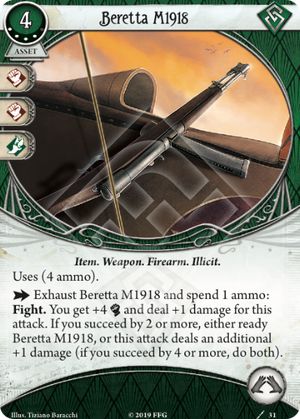The obvious card to compare this to is Chicago Typewriter, since both are 2-handed, 4 XP rogue weapons.
- Cost: The Beretta is slightly cheaper to play.
- Damage and ammo: Both can do up to 3 damage per action once they are in play, and both have 4 ammo.
- Combat bonuses: The Baretta gives a bigger upfront combat bonus, while the Typewriter allows you to use up extra actions to get +2 combat for each action spent (this might seem terrible, but it does increase the total damage output for very high fight enemies who you would otherwise fail fight tests against). If you need to ready the Beretta, this takes away the combat bonus advantage of the Baretta over the Typewriter, since you have to succeed by an additional 2.
- Risk: the Baretta has a glaring weakness of requiring exhausting it to fight. It can ready again if you succeed by 2, but this could get you in the sticky situation of missing and having your Beretta "jammed." So it's good to have an escape mechanism if you are using the Beretta (which can be as simple as high agility to evade).
If you do the math on damage per action (factoring in the chance of missing, based on the token pool), the Beretta deals more damage than the Typewriter when only one shot is needed per round, especially against higher fight enemies. The one attack per round might be enough for some parts of the game, especially if you are using a "hit and run" strategy focused on evading enemies and getting clues. Because of the +4 combat bonus, it offers a very high chance of dealing at least 2 damage. But the Typewriter deals more damage if you need to attack multiple times per round. So the choice depends mainly on what type of attacking you will be doing with your investigator. Of course, you can take both, and play the Beretta earlier in the game to fight lower health enemies (especially 2-3 health enemies), and play the Typewriter later to fight high health bosses.
